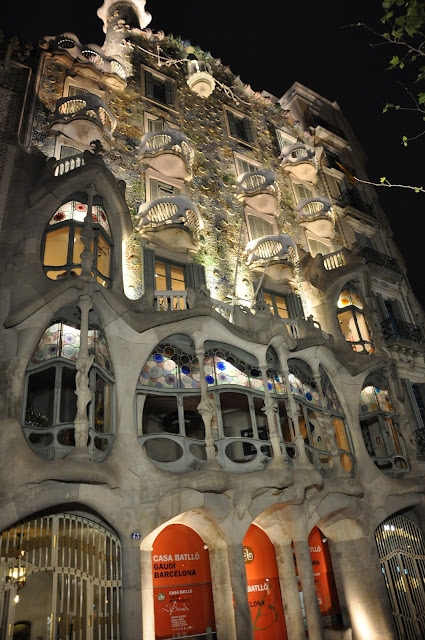Even though
I have been lucky enough to visit many of the famous sites of Barcelona I have
to admit I have been putting off writing about them. They are so daunting and
there’s so much to write about. Today however I will make a start on it,
starting with Gaudí’s famous Casa Batlló.
At the
beginning of 1900’s the habitants of Barcelona enjoyed great economical growth.
The city was growing as well and it was decided that the wall that the Romans
built around the city had to be knocked down to allow the city to spread. As
suddenly there was plenty of space the rich people of Barcelona started to buy
up big areas of land that were still close to the city and build nice big
houses. This is how Passeig de Grácia was born.
The Batlló
family was amongst these rich families who had a house on the new land. This is
how it looked originally.
They wanted
something a big more exciting, however. They asked Gaudí to make some changes
to it. Gaudí worked on the house for 2 years and he managed to make it WAY more
exciting than it was before.
Before I
launch into the story of the façade I’ll quickly tell you something
interesting. At that time people were convinced that the best part of the house
to live in was the first floor. They didn´t have to climb too many stairs, it wasn´t
too hot in summer and wasn’t too cold at winter, so it seemed like the perfect floor
to live on. This is why on all those houses that were built at that time the
first floor balcony is the most lavishly done, has the biggest windows and
satisfies an important social aspect: to see others and be seen by others. When
you walk on Passeig de Grácia, and generally in the inner city, keep an eye on
the houses to see this phenomenon for yourself.
Usually the
ground floor was a welcoming area and a grand staircase lead to the living
quarters. When the family wasn’t too big they let out the second and the third
floor to others, and the top floor, or the penthouse, that now would be the
most expensive part of the house, left for the servants.
Nobody
really knows what Gaudí wanted to envisage with this house. It is so colourful
and unusual that there are many theories that circle around about it. According
to one he got the idea for the façade after the carnivals that used to process
in front of it. You can see the many colours that remind us of falling confetti
and the balconies look like masks. Some say that the front looks like a big
pond where the balconies represent water lilies, and there´s a connection
mentioned with Monet´s garden. Have a look at the painting and compare them,
what do you think?
The most
popular theory (the one I like the best) says that the house looks like a huge
dragon, perhaps it is a reference for Saint George, Barcelona’s adored patron
saint. If you look at the roof, it clearly resembles a dragon’s hide with the
scales sticking out of it, and the blobs on the edge look like its spine. The
balconies represent the skulls of the people the dragon ate and the grey
columns look like bones. Indeed, it’s not hard to imagine that the first floor
represents the belly of the beast. This why many locals call it the Dragon or
the Bone House.
I have to
walk in front of Casa Batlló every day and I never fail to look up and admire
the house. I admire Gaudí and he was a genius but I also admire the people of
Barcelona who were happy to ‘let him loose’ and come up with ideas
so strange and so radical at that time and make a house like this.
I could
hardly wait to go inside and finally yesterday I made it happen. I will
continue the description in the next few blogs. Until then, enjoy the photos of
this amazing house.













No comments:
Post a Comment